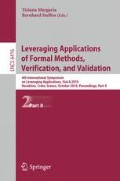Abstract
We present a method for the prediction of the performance of a service-oriented architecture during its early stage of development. The system under scrutiny is modelled with the UML and two profiles: UML4SOA for specifying the functional behaviour, and MARTE for the non-functional performance-related characterisation. By means of a case study, we show how such a model can be interpreted as a layered queueing network. This target technique has the advantage to employ as constituent blocks entities, such as threads and processors, which arise very frequently in real deployment scenarios. Furthermore, the analytical methods for the solution of the performance model scale very well with increasing problem sizes, making it possible to efficiently evaluate the behaviour of large-scale systems.
Access this chapter
Tax calculation will be finalised at checkout
Purchases are for personal use only
Preview
Unable to display preview. Download preview PDF.
References
Balsamo, S., Di Marco, A., Inverardi, P., Simeoni, M.: Model-Based Performance Prediction in Software Development: A Survey. IEEE Trans. Software Eng. 30(5), 295–310 (2004)
Bard, Y.: Some extensions to multiclass queueing network analysis. In: Third International Symposium on Modelling and Performance Evaluation of Computer Systems, pp. 51–62. North-Holland, Amsterdam (1979)
Baskett, F., Mani Chandy, K., Muntz, R.R., Palacios, F.G.: Open, closed, and mixed networks of queues with different classes of customers. J. ACM 22(2), 248–260 (1975)
Becker, S., Koziolek, H., Reussner, R.: Model-based performance prediction with the palladio component model. In: Proceedings of the 6th international workshop on Software and performance, vol. 65. ACM, New York (2007)
Mani Chandy, K., Neuse, D.: Linearizer: A heuristic algorithm for queueing network models of computing systems. Commun. ACM 25(2), 126–134 (1982)
Franks, G., Maly, P., Woodside, M., Petriu, D., Hubbard, A.: Layered Queueing Network Solver and Simulator User Manual (2005), http://www.sce.carleton.ca/rads/lqns
Franks, G., Omari, T., Murray Woodside, C., Das, O., Derisavi, S.: Enhanced modeling and solution of layered queueing networks. IEEE Trans. Software Eng. 35(2), 148–161 (2009)
Gilmore, S., Gönczy, L., Koch, N., Mayer, P., Tribastone, M., Varró, D.: Non-functional properties in the model-driven development of service-oriented systems. Software and System Modeling (2010)
Gordon, W.J., Newell, G.F.: Closed queuing systems with exponential servers. Operations Research 15(2), 254–265 (1967)
Hillston, J.: A Compositional Approach to Performance Modelling. Cambridge University Press, Cambridge (1996)
Koziolek, H., Reussner, R.: A model transformation from the palladio component model to layered queueing networks. In: Kounev, S., Gorton, I., Sachs, K. (eds.) SIPEW 2008. LNCS, vol. 5119, pp. 58–78. Springer, Heidelberg (2008)
Wirsing, M., et al.: Sensoria: Engineering for Service-Oriented Overlay Computers. MIT Press, Cambridge (2009)
Mayer, P., Koch, N., Schroeder, A., Knapp, A.: The UML4SOA Specification. Specification, LMU Munich (2009), http://www.uml4soa.eu/wp-content/uploads/uml4soa_spec.pdf .
Mayer, P., Schroeder, A., Koch, N.: MDD4SOA: Model-Driven Service Orchestration. In: EDOC, pp. 203–212. IEEE Computer Society, Los Alamitos (2008)
Object Management Group (OMG): UML Superstructure Specification 2.1.2. Technical report, OMG (2007), http://www.omg.org/spec/UML/2.1.2/Superstructure/PDF/ (last accessed on May 5, 2009)
Object Management Group (OMG). A UML Profile for MARTE: Modeling and Analysis of Real-Time Embedded systems, Beta 2. Technical report, Object Management Group (2008)
Object Management Group (OMG). Service oriented architecture Modeling Language(SoaML), Beta 1. Technical report, Object Management Group (2009)
Murray Woodside, C., Petriu, D.C., Petriu, D.B., Shen, H., Israr, T., Meseguer, J.: Performance by unified model analysis (PUMA). In: WOSP, pp. 1–12 (2005)
Author information
Authors and Affiliations
Editor information
Editors and Affiliations
Rights and permissions
Copyright information
© 2010 Springer-Verlag Berlin Heidelberg
About this paper
Cite this paper
Tribastone, M., Mayer, P., Wirsing, M. (2010). Performance Prediction of Service-Oriented Systems with Layered Queueing Networks. In: Margaria, T., Steffen, B. (eds) Leveraging Applications of Formal Methods, Verification, and Validation. ISoLA 2010. Lecture Notes in Computer Science, vol 6416. Springer, Berlin, Heidelberg. https://doi.org/10.1007/978-3-642-16561-0_12
Download citation
DOI: https://doi.org/10.1007/978-3-642-16561-0_12
Publisher Name: Springer, Berlin, Heidelberg
Print ISBN: 978-3-642-16560-3
Online ISBN: 978-3-642-16561-0
eBook Packages: Computer ScienceComputer Science (R0)

